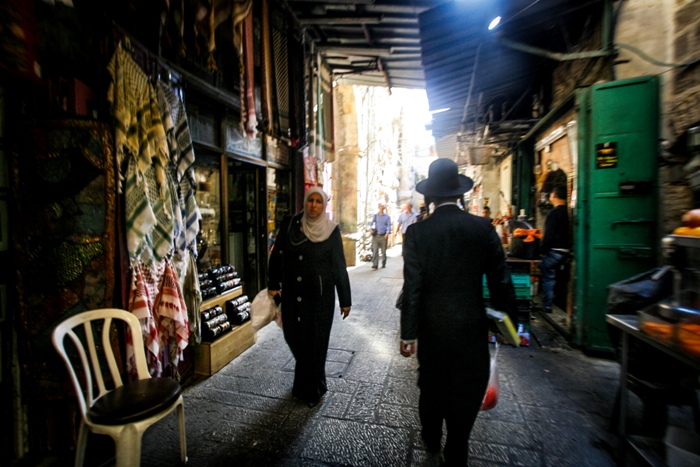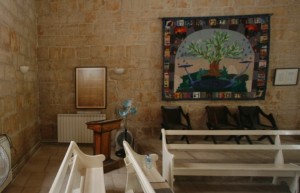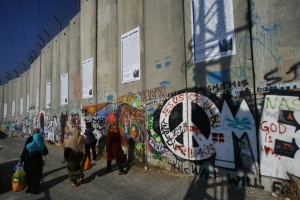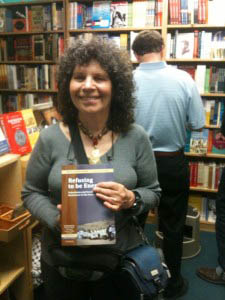![]() For our most recent public statements about Palestine/Israel and other peace issues visit our Resources page. If you’re looking for answers to common questions about Canadian Quaker positions on the boycott of illegal settlement products, see this FAQ.
For our most recent public statements about Palestine/Israel and other peace issues visit our Resources page. If you’re looking for answers to common questions about Canadian Quaker positions on the boycott of illegal settlement products, see this FAQ.

A street scene in Jerusalem
Quakers have been concerned for peace in various parts of the world for centuries. Many Quakers have felt led to visit Israel/Palestine and to work alongside Jewish Israeli and Palestinian peace advocates toward a just peace that would benefit all in the region.
In 2009, Quakers adopted a position (PDF) that reads in part:
After a long history of supporting nonviolent peace initiatives, participating in dialogues, sending letters to government, and making representations to diplomats, Canadian Friends (Quakers) felt the need to pool their information and experience to set a common basis for their advocacy efforts for peace in Israel and Palestine....
We are moved by the sufferings of the Palestinian and Israeli peoples. This suffering has gone on too long and must not be allowed to continue. We are aware that Israel was born out of horrific violence perpetrated on the Jews—however, the Palestinians were not the perpetrators. We know that both Israelis and Palestinians have committed acts of violence against each other. We are also aware of the huge inequality of power between them.
As a people of faith, we challenge all people, and particularly people of faith, not to put their trust in tanks or bombs or military aggression, but to open themselves to the Spirit of Love, which counsels a path of nonviolence. Such a path recognizes the dignity of all peoples and seeks solutions to international conflicts through just and peaceful means.
As Quakers, we reject the use of military force and violence by state or non-state actors. We believe that strategies of nonviolence are the only ethically sound, and ultimately more successful, strategies for overcoming oppression. Our experience with nonviolence has shown that there is a place both for acts of resistance and for the provision of a safe space for individuals of opposing views to dialogue. There have been many dialogue activities, and further opportunities for such work may open up. However, Palestinian nonviolent activists and their Israeli allies agree that the current need is for strong acts of nonviolent resistance and international advocacy.

Inside Ramallah Meeting House in the West Bank.
In 2010, Friends in Ramallah in the occupied West Bank, wrote, as part of their epistle to Friends everywhere: “We ask Friends to discern what, in their own circumstances, they can best do to support those working to end this conflict and bring peace and justice to this troubled region. We ask Friends to consider adopting boycott, divestment and sanctions as we may be led to do, individually or corporately.”
Early in 2013, CFSC began considering this request to support the Boycott, Divestment, Sanctions movement as a nonviolent measure advocated by those working to bring lasting peace to the region.
In 2014, after a long period of careful reflection and discernment, Canadian Friends approved an Addendum (PDF) to the 2009 Israel/Palestine position. The Addendum notes that “Our hearts are full of compassion for Israelis and Palestinians, all of whom are suffering from the effects of the occupation.”
In the Addendum, Quakers call upon the Canadian government to require that products made in the illegal settlements be accurately labelled as such, and encourage Canadian Friends, individually and corporately, to boycott products of illegal Israeli settlements in the West Bank and East Jerusalem, including those wrongly labelled as “made in Israel.” Download the Addendum to find a list of websites with more information about BDS.
More recently, Friends have called for Canada to end its military relationship with all states, including Israel, that may use Canadian arms to violate basic human rights, held a full weekend study session on the topic Palestine/Israel, Nonviolence, and F/friends (videos are available), and affirmed that our ethical investment policy has proven sound and we are not invested with any companies on an occupations investment screen list.
Do you have partners on the ground?
Yes! Since 2017 CFSC has supported Mesarvot as they share accurate information and support young people who have decided to refuse to serve in the Israeli military for reasons of conscience. Read more about the context of this work here.
What can I do?

The separation wall near Bethlehem, Occupied West Bank. Canada’s official policy states, “contrary to international law under the Fourth Geneva Convention. Canada not only opposes Israel’s construction of a barrier extending into the occupied territories, but also expropriations and the demolition of houses and economic infrastructure carried out for this purpose.”
The following are a few ways you can take action individually or with a group you belong to. Feel free to contact us for help with any of these:
- In addition to the coverage you are already getting from popular news sources, learn about recent news and events from a different perspective through sources like the International Middle East Media Centre or B'Tselem.
- Engage in ecumenical or interfaith dialogue. Quaker Meetings can connect with other congregations and faith groups to provide spaces for mutual learning. Many Quakers have a great deal of experience in the region, which they would be happy to share. Many others do not have experience but are interested in learning. Contact us if you need assistance in connecting with other faith groups or finding presenters for events.
- Read our statement on becoming founding members of the No Way to Treat a Child campaign in Canada and consider supporting the campaign.
- If you are so led, engage in the global Boycott, Divestment Sanctions campaign:
- Boycott products made in illegal settlements in the West Bank and East Jerusalem and labelled incorrectly as “made in Israel.”
- Write to your local newspaper and to the companies you are boycotting to explain your decision and request that they reconsider their practices. You can ask CFSC for sample letters.
- Have an ecumenical/interfaith meeting with retailers selling illegal settlement products to express your concerns.
- Explore the following questions personally, with your family and friends, and ask your elected officials and those seeking election:
- How will you support the human rights of Palestinians and Israelis? How can we assure that Israelis and Palestinians shall be free from collective punishment, arbitrary detention, indiscriminate attack, and other abuses of their basic dignity and human rights?
- How can the State of Israel, Hamas, and the Palestinian Authority all be held accountable for their actions, including any violations of international law?
- Canada's official policy states, “Israeli settlements in the occupied territories are a violation of the Fourth Geneva Convention. The settlements also constitute a serious obstacle to achieving a comprehensive, just and lasting peace.” How do you respond to Israel’s maintenance and expansion of settlements in the West Bank and East Jerusalem, which Canada acknowledges are illegal and detrimental to the peace process?
- Visit Israel and include a tour of the West Bank offered by Palestinians living under occupation (e.g. Siraj centre. Note CFSC does not run these tours and as such is unable to accept responsibility for security risks if you choose to participate.)
The work of individual Quakers supported by CFSC
For decades, Friends have supported nonviolent peace initiatives, participated in inter-faith dialogues, communicated with governments, and made representations to diplomatic missions. CFSC has an Israel/Palestine Working Group actively engaging on our concerns. There are several other resources produced by Canadian Friends that may be helpful to you: Canada and Israel: The Business of Militarism, an article discussing some of our research into the military relationship between Canada and Israel. This research also informed our statement on Canada's involvement in the arms trade.
This article by Lana Robinson describes her experience representing Quakers on a 2019 Canadian church leaders' delegation to Palestine/Israel. Watch the video below for more about Lana's experience:
In 2014 CFSC gave Linda Taffs an individual grant to support her participation on a Friends of Sabeel witness trip. While in Palestine/Israel, Linda was able to film several of the presentations that the group heard. Below is a clip of Israeli peace activist Jeff Halper (whom CFSC has sponsored on two speaking tours across Canada), discussing his belief that the world needs to move beyond the idea of a two state solution, which he argues is no longer possible:
Other videos recorded by Linda cover the topics of militarism in Israeli society, historical and modern day popular resistance by Palestinians, Christian Peacemaker Teams in Hebron, and Israeli demolitions of Palestinian homes. Note that the videos express the beliefs and experiences of the speakers, and not necessarily those of CFSC/Canadian Friends.
In 2013 CFSC staff visited the Palestinian Centre for Rapprochement between People and wrote a report, Reflections from Israel and Palestine (PDF).
 Maxine Kaufman Lacusta has written a book, which we highly recommend, Refusing to Be Enemies: Palestinian and Israeli Nonviolent Resistance to the Israeli Occupation. The book opens with Maxine introducing us to several nonviolent activists who tell us why they chose nonviolence and why they got involved in activism against the occupation.
Maxine Kaufman Lacusta has written a book, which we highly recommend, Refusing to Be Enemies: Palestinian and Israeli Nonviolent Resistance to the Israeli Occupation. The book opens with Maxine introducing us to several nonviolent activists who tell us why they chose nonviolence and why they got involved in activism against the occupation.
Through the voices of Palestinians and Israelis, the book then moves on to reflect on the last several decades of nonviolent activism in Israel/Palestine, on the question of both the triumphs and challenges of nonviolent organizing, and on activists' hopes and visions for the future.
There are many reviews of the book available online, like this one from Friends Journal and this one by Dave Greenfield of Saskatoon Monthly Meeting (PDF).
Also highly recommended is When the Rain Returns (2004). While dated, this book is still useful in sharing a balanced set of observations from the members of the International Quaker Working Party on Israel and Palestine during their visit to the region. Rick McCutcheon, a Canadian Friend, was a member of the working party, and has contributed a chapter. The book is informed by Quaker principles, one of which is that in crafting a settlement, all interested parties must be genuinely consulted and engaged with. The introductory chapter provides a balanced history of the region. Here is a one-page review of the book.

